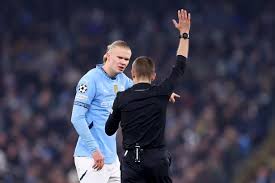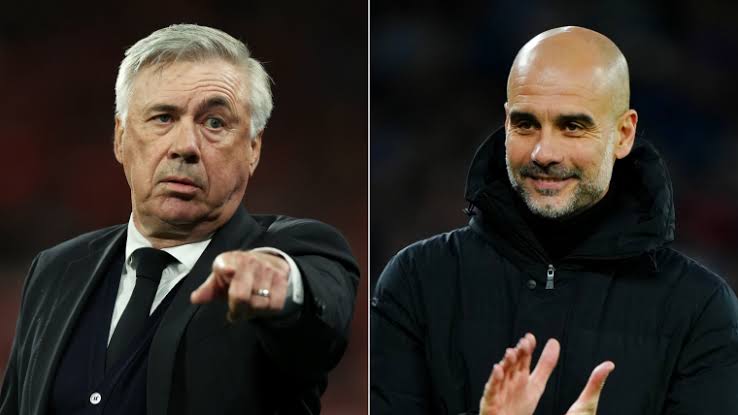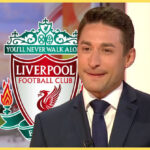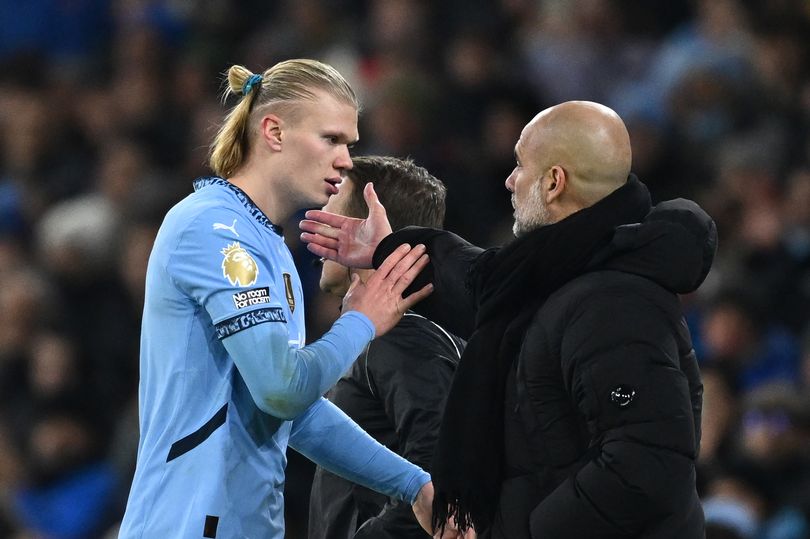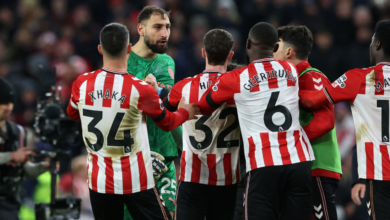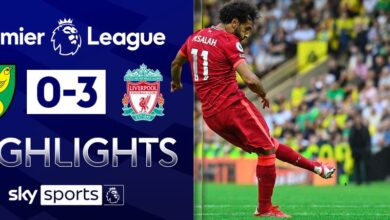Pep Guardiola reaction — What did Man City boss say after late loss to Real Madrid?

Pep Guardiola expressed his frustration following Manchester City’s 3-2 loss to Real Madrid in the first leg of their Champions League knockout tie. The match, which took place at the Etihad Stadium, was an emotional rollercoaster for City, as they twice took the lead through Erling Haaland, only for Real Madrid to mount a dramatic late comeback. Kylian Mbappe had equalized for Madrid between City’s two goals, and with the game heading into the final minutes, former City player Brahim Diaz brought Madrid level once again. Then, in injury time, Jude Bellingham scored to give Madrid a slender advantage going into the return leg at the Bernabeu.
Guardiola admitted that it was a tough result to swallow, especially after seeing the hard-earned lead slip away so late in the game. He pointed out that this loss felt particularly hard because City had been the better team in recent encounters with Real Madrid, but this time the game was much more evenly matched. Despite his team being in control for much of the match, especially in the first half, he acknowledged that Real Madrid had chances, and City’s goalkeeper Ederson had been their standout player, making several crucial saves.
Guardiola reflected on how difficult it can be when a team plays well but still doesn’t get the desired result. He mentioned how, in the first 15 minutes, Madrid started well, but after that, City took control and looked like the better team with the ball. However, in the second half, City struggled to maintain their passing rhythm, and their attempts to attack quickly played into Madrid’s hands. He also drew comparisons to earlier matches this season, where City had similarly let leads slip away, citing games against Feyenoord, Sporting Lisbon, Brentford, and Manchester United. He emphasized how hard it is to consistently perform at this level and how difficult it is when things don’t go as planned despite playing well.
Despite the disappointment, Guardiola remained positive about many aspects of his team’s performance. He acknowledged that they had done many good things in the game, but the result was ultimately what mattered most. He praised the quality of Real Madrid, acknowledging that they are a tough opponent. At the same time, Guardiola reflected on the areas where his team could improve, particularly in terms of decision-making and maintaining solid defensive play in key moments.
For Guardiola, the most difficult part was seeing his players suffer after the match, knowing how much effort they had put into the game. He highlighted how his players had done everything they could, but ultimately they were not able to make the right decisions in critical moments, leading to the late goals that cost them the win. The loss left City in a tough position heading into the second leg, but Guardiola remained focused on the need for improvement and preparation for the challenge ahead.
Guardiola’s comments reflected both the frustration of the defeat and the acknowledgment of the challenges that Manchester City faced throughout the match. Despite the disappointment, he understood that the result did not erase the progress his team had made in various aspects of their game. While he focused on the shortcomings, particularly in the final moments, he also recognized the quality of the football City had played in stretches during the encounter. However, his reflections on the loss showed how critical it was for his team to improve in certain areas if they were to achieve their goal of progressing to the next round of the Champions League.
One of the most telling aspects of Guardiola’s post-match comments was his mention of the recurring issue of City’s inability to manage games when they were in a winning position. This season, particularly in the Champions League, City had shown signs of inconsistency, giving up leads late in matches. Guardiola seemed to suggest that this was a mental and tactical challenge that needed to be addressed. It wasn’t simply about playing well for large portions of the game, but about being able to close out matches when things became tense. The way Madrid had struck back late in the game demonstrated the ruthlessness of elite teams, something Guardiola had experienced many times in his managerial career.
When discussing the match itself, Guardiola was careful not to take away from the immense quality of Real Madrid, highlighting that they were always a threat and capable of capitalizing on even the smallest mistake. He credited them for their quality in the final third, acknowledging the talent of players like Mbappe, Vinicius Jr., and Bellingham, who had been instrumental in the late turnaround. Even as City held the advantage, Guardiola knew that the tie was far from over, and Madrid’s quality made them dangerous opponents, especially when they had players capable of changing the game in an instant.
However, Guardiola didn’t shy away from the reality that, despite the positives in City’s play, they needed to learn from the loss. He pointed to the need for improvement in the final stages of games, where decision-making had often been lacking. Whether it was in defensive situations or in attack, City had shown that they could be vulnerable at the most crucial moments. Guardiola’s words suggested that the team needed to sharpen their focus and make better decisions, particularly when they had the upper hand.
The manager also reflected on the mental toll such losses take on players, especially after they had worked so hard to get themselves into a winning position. He understood that, while the players would be disappointed, they needed to channel that frustration into a positive reaction for the second leg. For Guardiola, the key would be to ensure that his players did not allow this defeat to impact their confidence. They had been in this situation before, and it was important to maintain belief and focus for the next challenge. The task ahead was to go to the Bernabeu, one of the most daunting stadiums in Europe, and find a way to overturn the deficit.
As Guardiola acknowledged, the tie was still very much alive. City had shown they could compete with Madrid, but they would need to be more solid in the return leg. He believed in his team’s ability to recover and rise to the occasion, but it was clear that this would require a much more focused and disciplined performance. The loss at home was tough, but Guardiola’s experience in managing big games meant that he understood the mental and tactical adjustments his team needed to make for the second leg.
The focus for City now shifted to preparation for the crucial return leg at the Bernabeu. Guardiola would likely spend the days leading up to the match analyzing what went wrong and making sure his players understood the areas where they needed to improve. In the world of top-level football, there was little time for dwelling on defeats, especially in the knockout stages of the Champions League, and Guardiola’s leadership would be key in ensuring that the squad bounced back quickly.
City’s defeat to Real Madrid also served as a reminder of the fine margins that often define success in the Champions League. A few misplaced passes, a moment of indecision, or a defensive lapse can be the difference between victory and defeat at the highest level. As Guardiola noted, City had been the better team in several recent encounters with Madrid, but football is unpredictable, and this match was a prime example of how things can change in an instant.
Despite the setback, Manchester City remained in a strong position to fight for the result they wanted. The next leg in Madrid would be a huge test of their resilience and character. Guardiola’s belief in his players would be tested, but he would undoubtedly work hard to ensure they were ready for the challenge ahead.
One of the strengths of Guardiola’s management is his ability to analyze situations objectively and extract the lessons needed to move forward. He would undoubtedly look at the positives from the match, even if the result left a bitter taste. The way City controlled large portions of the game, their attacking play, and the moments where they dominated Madrid’s defense were all things to be built upon. However, it was clear that the mental aspect of their game would need to improve to ensure they didn’t fall victim to the same fate again.
The players, too, would have to take responsibility for the loss. They would need to take stock of their performances and focus on ensuring that their concentration levels were at their peak for the return leg. The likes of Haaland, De Bruyne, Foden, and others would need to dig deep and show why they were some of the best players in Europe. Haaland, especially, had been clinical in front of goal, and his leadership would be crucial as City needed to stay mentally sharp in Madrid.
For Manchester City, this Champions League tie was far from over. They would need to regroup, re-focus, and be ready for the second leg in Madrid. Real Madrid’s last-minute comeback had given them a slight advantage, but City had the quality and the ability to turn things around. It was a matter of taking the lessons from this frustrating loss and ensuring that they were better prepared for the task ahead.
Guardiola’s experience and leadership would be crucial in guiding his players through this difficult moment. His ability to motivate and inspire his team would be key as they headed into one of the most important matches of their season. The tie was still in their hands, and if City could learn from the mistakes of the first leg, they still had a very real chance of progressing to the next stage of the Champions League.
